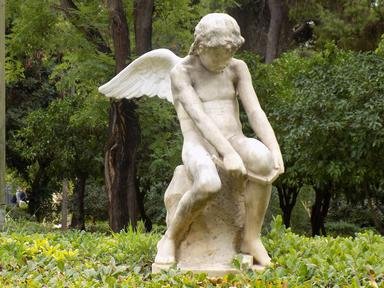Quiz Answer Key and Fun Facts
1. Our first figure, Hera, often faced troubles in her marriage to her husband, Zeus. Hera's method of dealing with her cheating husband was to take revenge on the woman who rivalled her. Which of Zeus' conquests did Hera put under the guard of the hundred-eyed giant, Argus?
2. The fisherman, Glaucus, is the next victim of Cupid's failings in making love work. Glaucus was point-blank rejected by his love, Scylla, due to her being terrified by the form he had assumed. Which mythological creature was Glaucus transformed into before appearing to Scylla?
3. In the seemingly rare occasion that two mythological figures *share* a love for one another, Cupid's arrow again misses and the story ends in tragedy. What is the name of the youth who drowned whilst swimming to see his love, Hero?
4. Although centaurs tend to be represented as more civilised than other mythological monsters, they were known for their occasional fits of violence. One such example ruined the wedding day of a mythological couple. What was the name of this unfortunate couple?
5. This next story involves a love-struck princess and an uninterested hero. The hero was Theseus and the princess was the one who provided him with a sword and ball of thread before he faced the Minotaur. Following the encounter she was literally dumped by the hero. What was her name?
6. Theseus later married twice, fathering a son - Hippolytus. The boy was born to Theseus' first wife, the Amazon queen, Antiope, and was loved by his father's second wife, a love he did not share. What was the name of Theseus' vengeful second wife?
7. After doing all she could to help Jason in his quest for the Golden Fleece, this woman was slightly more than unhappy after Jason divorced her and married Princess Creusa of Corinth. What was this woman's name?
8. After falling in love with the maiden, Atalanta, Melleager's life was ended by his own mother! Which mythological creature did Melleager and Atalanta famously hunt before Melleager's death?
9. Scylla, princess of Megara, fell in love only to be coldly rejected. The subject of her love was a man who was closely associated with the Minotaur as well as being the enemy of Scylla's father, King Nisus. What was his name?
10. Vertumnus was Roman god of seasons and change. He longed for a particular wood nymph who dedicated herself to maintaining her beautiful gardens. In the end Vertumnus...got the girl!? Well, I guess Cupid isn't that stupid after all. What was the name of the wood nymph who eventually returned the love of Vertumnus?
Source: Author
doublemm
This quiz was reviewed by FunTrivia editor
CellarDoor before going online.
Any errors found in FunTrivia content are routinely corrected through our feedback system.

